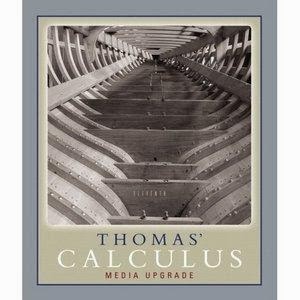Wednesday, February 8, 2017
Download Solution manual THOMAS FINNEY CALCULUS 11th Edition free PDF
Download Solution manual THOMAS FINNEY CALCULUS 11th Edition free PDF
Thomas Calculus - 11th Edition - Solution Manual

Download Solution manual THOMAS FINNEY CALCULUS
Description:
The new edition of Thomas is a return to what Thomas has always been: the book with the best exercises. For the 11th edition, the authors have added exercises cut in the 10th edition, as well as, going back to the classic 5th and 6th editions for additional exercises and examples.
The books theme is that Calculus is about thinking; one cannot memorize it all. The exercises develop this theme as a pivot point between the lecture in class, and the understanding that comes with applying the ideas of Calculus.
In addition, the table of contents has been refined to match the standard syllabus. Many of the examples have been trimmed of distractions and rewritten with a clear focus on the main ideas. The authors have also excised extraneous information in general and have made the technology much more transparent.
The ambition of Thomas 11e is to teach the ideas of Calculus so that students will be able to apply them in new and novel ways, first in the exercises but ultimately in their careers. Every effort has been made to insure that all content in the new edition reinforces thinking and encourages deep understanding of the material.
Table of Contents:
1. Preliminaries:
Real Numbers and the Real Line.
Lines, Circles, and Parabolas.
Functions and Their Graphs.
Identifying Functions; Mathematical Models.
Combining Functions; Shifting and Scaling Graphs.
Trigonometric Functions.
Graphing with Calculators and Computers.
2. Limits and Derivatives:
Rates of Change and Limits.
Calculating Limits Using the Limit Laws.
Precise Definition of a Limit.
One-Sided Limits and Limits at Infinity.
Infinite Limits and Vertical Asymptotes.
Continuity.
Tangents and Derivatives.
3. Differentiation:
The Derivative as a Function.
Differentiation Rules.
The Derivative as a Rate of Change.
Derivatives of Trigonometric Functions.
The Chain Rule and Parametric Equations.
Implicit Differentiation.
Related Rates.
Linearization and Differentials.
4. Applications of Derivatives:
Extreme Values of Functions.
The Mean Value Theorem.
Monotonic Functions and the First Derivative Test.
Concavity and Curve Sketching.
Applied Optimization Problems.
Indeterminate Forms and LHopitals Rule.
Newtons Method.
Antiderivatives.
5. Integration:
Estimating with Finite Sums.
Sigma Notation and Limits of Finite Sums.
The Definite Integral.
The Fundamental Theorem of Calculus.
Indefinite Integrals and the Substitution Rule.
Substitution and Area Between Curves.
6. Applications of Definite Integrals:
Volumes by Slicing and Rotation About an Axis.
Volumes by Cylindrical Shells.
Lengths of Plane Curves.
Moments and Centers of Mass.
Areas of Surfaces of Revolution and The Theorems of Pappus.
Work.
Fluid Pressures and Forces.
7. Transcendental Functions:
Inverse Functions and their Derivatives.
Natural Logarithms.
The Exponential Function.
ax and loga x.
Exponential Growth and Decay.
Relative Rates of Growth.
Inverse Trigonometric Functions.
Hyperbolic Functions.
8. Techniques of Integration:
Basic Integration Formulas.
Integration by Parts.
Integration of Rational Functions by Partial Fractions.
Trigonometric Integrals.
Trigonometric Substitutions.
Integral Tables and Computer Algebra Systems.
Numerical Integration.
Improper Integrals.
9. Further Applications of Integration:
Slope Fields and Separable Differential Equations.
First-Order Linear Differential Equations.
Eulers Method.
Graphical Solutions of Autonomous Equations.
Applications of First-Order Differential Equations.
10. Conic Sections and Polar Coordinates:
Conic Sections and Quadratic Equations .
Classifying Conic Sections by Eccentricity.
Quadratic Equations and Rotations.
Conics and Parametric Equations; The Cycloid.
Polar Coordinates .
Graphing in Polar Coordinates.
Area and Lengths in Polar Coordinates.
Conic Sections in Polar Coordinates.
11. Infinite Sequences and Series:
Sequences.
Infinite Series.
The Integral Test.
Comparison Tests.
The Ratio and Root Tests.
Alternating Series, Absolute and Conditional Convergence.
Power Series.
Taylor and Maclaurin Series.
Convergence of Taylor Series; Error Estimates.
Applications of Power Series.
Fourier Series.
12. Vectors and the Geometry of Space:
Three-Dimensional Coordinate Systems.
Vectors.
The Dot Product.
The Cross Product.
Lines and Planes in Space.
Cylinders and Quadric Surfaces .
13. Vector-Valued Functions and Motion in Space:
Vector Functions.
Modeling Projectile Motion.
Arc Length and the Unit Tangent Vector T.
Curvature and the Unit Normal Vector N.
Torsion and the Unit Binormal Vector B.
Planetary Motion and Satellites.
14. Partial Derivatives:
Functions of Several Variables.
Limits and Continuity in Higher Dimensions.
Partial Derivatives.
The Chain Rule.
Directional Derivatives and Gradient Vectors.
Tangent Planes and Differentials.
Extreme Values and Saddle Points.
Lagrange Multipliers.
*Partial Derivatives with Constrained Variables.
Taylors Formula for Two Variables.
15. Multiple Integrals:
Double Integrals.
Areas, Moments and Centers of Mass*.
Double Integrals in Polar Form.
Triple Integrals in Rectangular Coordinates.
Masses and Moments in Three Dimensions.
Triple Integrals in Cylindrical and Spherical Coordinates.
Substitutions in Multiple Integrals.
16. Integration in Vector Fields:
Line Integrals.
Vector Fields, Work, Circulation, and Flux.
Path Independence, Potential Functions, and Conservative Fields.
Greens Theorem in the Plane.
Surface Area and Surface Integrals.
Parametrized Surfaces.
Stokes Theorem.
The Divergence Theorem and a Unified Theory.
Appendices:
Mathematical Induction.
Proofs of Limit Theorems.
Commonly Occurring Limits .
Theory of the Real Numbers.
Complex Numbers.
The Distributive Law for Vector Cross Products.
Determinants and Cramers Rule.
The Mixed Derivative Theorem and the Increment Theorem.
The Area of a Parallelograms Projection on a Plane.
Download Solution Manual
Available link for download